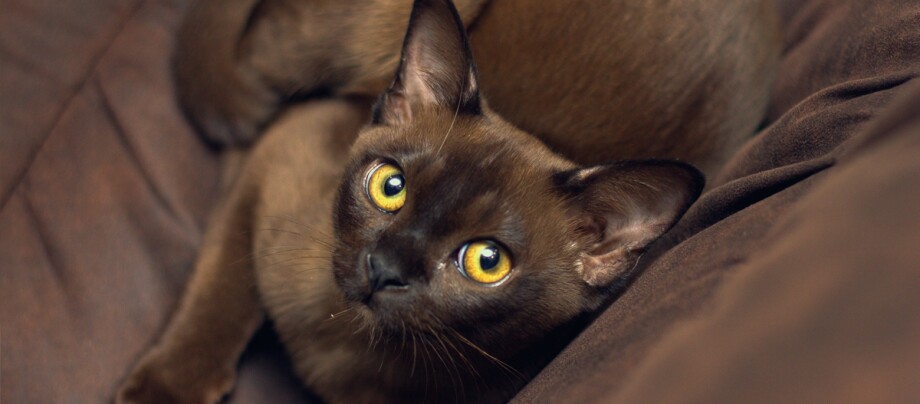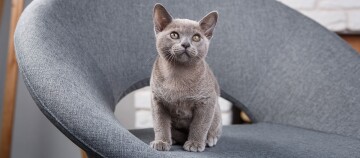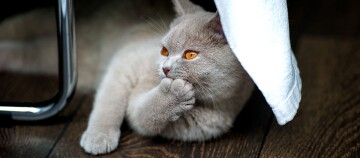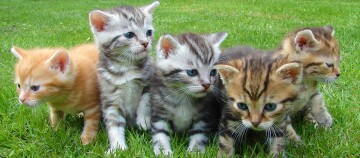Burmese Cats – Gentle and Affectionate Cat with Lots of Love and Attention
01.01.2024 - Reading time: 3 minutes

If you want an active cat that is well-disposed towards humans, you will find a loyal companion in the Burmese cat. The desire for human and animal companionship makes the oriental beauty an ideal family cat. This gentle cat is also open-minded towards children and has a definite need for sufficient physical and mental exercise. If socialised accordingly, it will develop a close bond with its humans.
NewsletterBurmese Cat
Breed | Burmese Cat |
Origin | Myanmar |
Size | small to medium-sized, length up to 50 centimetres |
Weight | Female 4 to 4.5 kilograms, male 5 to 6 kilograms |
Physique | muscular and strong; appears less compact than it is |
head shape | old Burmese type with elongated wedge shape, in Europe somewhat shorter and as a second variant somewhat shorter; eyes and ears set wide apart, eyelids typically oriental |
Eyes | green, amber |
Coat and colour | silky coat with little undercoat, close lying; ten different recognised colours; colour point |
Coat care | occasional brushing |
Special features | high life expectancy, well suited as a family pet |
Nature | gentle, curious, agile, needs a lot of activity, affectionate |
Owning | in the home only in pairs and with exercise on the secured balcony or in the garden |
Nature of the Burmese cat
The Burmese cat, like many oriental pedigree cats, is extremely intelligent and people-oriented. Burmese cats are also playful and curious. These cats definitely need the attention of their human companions, with whom they like to have extensive “conversations”.
Keeping and care
Burmese are low-maintenance cats and, so long as they are kept sufficiently occupied, they will make extremely agreeable housemates. Given their agility, they require lots of hiding and climbing places and plenty of toys, as well as scratching opportunities. These energetic animals are only suited to a certain degree to being kept purely as housecats. Ideally, they should at least have a secure balcony or garden where they can roam.
Even though Burmese cats tend to build up a close bond with their human companions, keeping them alone is not recommended. These cats are happy to have a quiet cat as a partner, because they tend to dominate. You should therefore provide your house cat with a cat partner if you have to leave them alone for a longer period of time because of your work.
Colours of the Burmese cat
The Burmese cat has a silky, light coat with only minimal undercoat due to the climate. Ideally, it has no pattern. Young cats often have a subtle tabby colouring. The facial mask of the Burmese may be somewhat darker.
The recognised colour scale for the Burmese cat includes ten different shades: Besides blue, seal, chocolate, red and their dilutions in cream and lilac, there are the bicolour varieties seal-tortoiseshell, lilac-tortoiseshell, blue-tortoiseshell and chocolate-tortoiseshell. The tortoiseshell variety refers to tricoloured cats, which display the aforementioned tortoiseshell colours in addition to their base colour.
Other countries or breeding areas such as New Zealand also recognise tabby markings and colours such as caramel, apricot or silver.
History
The Burmese cat originates from the former Burma, today Myanmar. It probably belonged to the 16 temple cat breeds kept by the Buddhist monks. Its Thai name Maeo Thong Daeng means copper cat. A US Navy doctor is said to have brought the first Burmese cat to America in 1930. Scientists and geneticists found that Wong Mau, which looked like a light brown Siamese cat, represented a separate breed. Wong Mau was mated with Tai Mau, a Siamese cat with Seal Point colouration. The further mating with the son of Wong Mau resulted in a litter of light brown cats, which are considered the progenitors of the modern breeding of this cat breed.
Special features
Although not scientifically proven, the beautiful Oriental is said to have a particularly long life span, between 12 and 18 years. Some even report an average age of 18 years. So when deciding on a Burmese cat, bear in mind that you will have to look after it for a very long time. This gentle and affectionate cat will reward you with lots of love and attention. Before buying a kitten, make sure that it comes from a recognised breeder and is well socialised.





